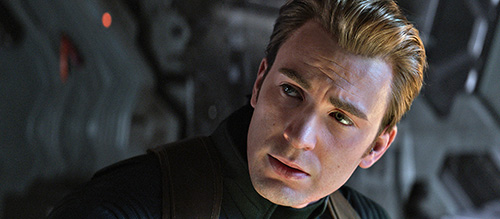A Tip of the Cap: Saying “So Long” to Steve
The Russos put together a superhero film in Endgame with dozens of heroes, a time travel plot that visits past movies and an epic battle for the fate of humankind. They had to walk the line of fan service, balance the lighthearted and the dour, and give satisfying conclusions to arcs going back eleven years, established by different writers and directors. I am once again stunned by their ability to execute such an unbelievably difficult task. Kevin Feige, the Russos, and the whole of the MCU have set the cinematic standard for event films.
Beyond the impressiveness of being able to successfully make this film, what I like about Endgame is that it’s wholly contingent on past films while also existing as its own chapter – to call this Infinity War 2 would be reductive. The characters follow new arcs in this film; Thor deals with his failure to save the world and resulting depression, Tony has to choose between the greater good and his own self-interest in a new way, and Cap… his journey is probably the most interesting.
I’ve never been a fan of Captain America. I found the character boring because his defining trait was being super moral. He’s the ultimate good guy that constantly puts the needs of the many over his own. He’s the antithesis to Tony, as evidenced in Avengers, Ultron and Civil War (I was Team Stark in that battle, superhero regulation is the real inevitability). In The First Avenger, Steve Rogers is scrawny but plucky and brave. He epitomizes what Captain America is expected to be, and receives the Super Soldier Serum to gain his superhuman abilities.
Even with the serum Cap is still human, but not in the same way as Tony Stark. When he wakes up in The Avengers, Cap is a man out of time. His old-fashioned good guy stereotype might have been a necessary counter-balance to Tony, but it wares on a viewer like me who has watched too much “Breaking Bad” or “Game of Thrones”. What is Captain America’s flaw? The fact that I’m asking that betrays the heart of the problem; he’s more Captain America than he is Steve Rogers. While this could very well be intentional, it makes for a boring film character. Meanwhile, the other characters in the MCU feel like real people rather than a virtuous paragon that embodies the Protestant ethic, and the decision to make Captain America that paragon in a post-Iraq (and post-Vietnam, and post-Iranian destabilization, and post-Indigenous American genocide, etc.) world struck me as discordant. Captain America as a symbol for the ultimate good is boring.
In Endgame, I really think Cap shows growth from previous films. Where he once would use brawn, he uses his brain – when Captain America gets on an elevator with undercover HYDRA agents, a reenactment of the scene in Winter Soldier, he poses as an agent of HYDRA himself to accomplish his goal rather than beating everyone up. He uses an underhanded move in a fight, punching himself (from The Avengers timeline) in the groin. I also enjoyed his presence in the final battle, and I found his will and strength endearing rather than annoying. Captain America is given an opportunity to use his strong will in a badass way during the fight with Thanos, continuing to get up and fight even after he’s thought to be taken out. Fulfilling the foreshadowing in Ultron where he alone could somewhat budge it, he wields Mjolnir in a last ditch effort to try and stop Thanos, proving that he is “worthy”. I’ve never been more excited to see Cap in such incredible moments, and the image of a bruised and bloodied Cap holding a broken shield makes for some sweet looking shots. Chris Evans nails the performance.
But it isn’t Captain America I was really impressed with; it was Steve Rogers.
The seeds for Steve’s ending are sown in a scene where he is helping people cope with the Vanishing. Steve is dressed in a plaid shirt, leading a support group because of his experience of coming out of the ice and adjusting to a new world. He’s forced to reflect upon his old life once again when he and Tony travel to 1970 where he sees Peggy Carter. Agent Carter is what he has missed the most through all of his experiences, and he sees her through a window; so close, yet so far. He can’t approach her because she knows he’s gone, and it will ruin the mission. Finally, when the job is done, Steve returns to the past to live out his life with Peggy. An aged Steve Rogers is shown at the end, and he won’t kiss-and-tell, but we know what he’s been up to. He passes the mantle of Captain America to his friend Sam Wilson (Falcon). He’s no longer a soldier out of time, he’s an old man who got to live out his life the way he always wanted. It’s in these types of moments across the films where I have liked Cap; where he stops being a super man and becomes… just a man.
I still wouldn’t call myself a Captain America fan, but the Russos did a fabulous job with him in this film. He doesn’t solely exist as a symbol for good, but is himself a human like Tony, Peter Quill, Clint and everyone else. Endgame serves as a worthy send off to Steve Rogers, the first Avenger, and that’s all I could have asked for.
[DISPLAY_ULTIMATE_SOCIAL_ICONS]


